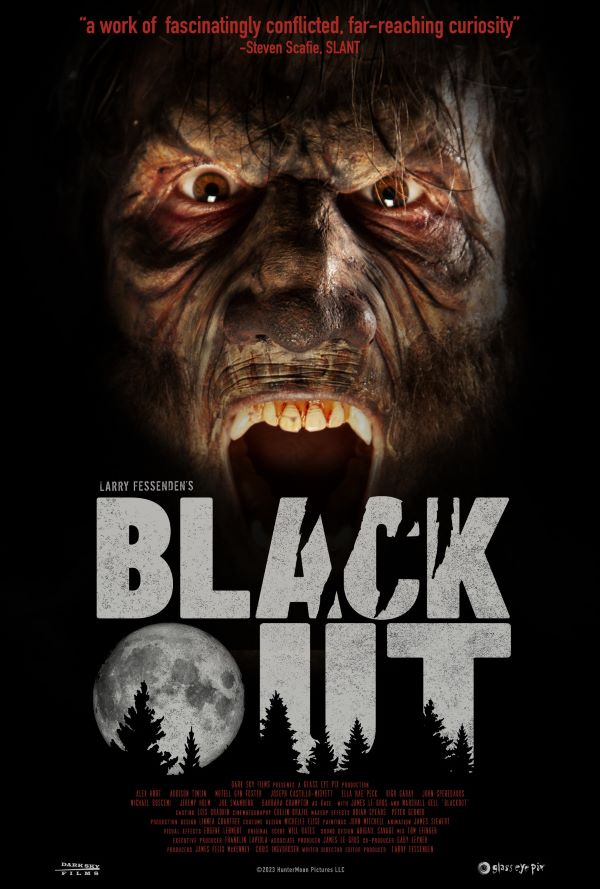If actors often make for compelling directors, then why not character actors? Larry Fessenden (“Depraved”) is a great That Guy character actor, and his work stands out in a range of genre movies, mostly horror. Fessenden’s also the producer and sometimes writer/director behind Glass Eye Pix’s rich catalog of American indie horror movies. Fessenden’s “Blackout,” a werewolf psychodrama, showcases his usual attention to performance and character-driven details. That compliment may seem surprising given that we’re talking about a low-budget monster movie where the lead and a few supporting cast members deliver amateurish performances.
Everybody’s a character in a Larry Fessenden movie, with their own quirks, limitations, and entanglements. We only get to see so much of that in “Blackout,” an imperfect, but often worthwhile adaptation of Fessenden’s own audio drama, one of Glass Eye’s “Tales from Beyond the Pale” radio drama-style horror stories.
The audio play version of “Blackout” was a B-movie-sized sketch about Charley (Fessenden), a desperate loner who tries to get his affairs in order before he reluctantly transforms into a werewolf again. This movie adaptation has more plot, some of which is too generic to be necessary. The new “Blackout” also features several standout moments and a Poe-like air of melancholy dread that Fessenden fans are probably already familiar with. “Blackout” is nothing new, or even essential, but it mostly works anyway thanks to Fessenden and his cast’s impressive collaboration.
“Blackout” trails after doomed Charley Barrett (Alex Hurt), a well-liked drunk who also happens to be a werewolf. Charley knows he’s a lycanthrope and wants to kill himself before he can kill more innocent bystanders. Charley wanders around the exurban town of Talbot Falls in a cold sweat, touching base with a number of people that he wants to square up with. Mostly people he either wants to avoid or doesn’t want to get into a deep conversation with. Like nosey, but well-meaning Pastor Francis (John Speredakos), from whom Charley bums a ride. Or the crotchety real estate developer Jack Hammond (Marshall Bell), with whom Charley keeps butting heads. There’s also Sharon Hammond (Addison Timlin), Charley’s worried ex and Jack’s estranged daughter; she sees other people (an expertly cast Joe Swanberg).
Meanwhile, the police search for whoever’s responsible for a series of random murders. Civic-minded cop Alice (Ella Rae Peck) and her skeptical partner Luis (Joseph Castillo-Midyett) spot some animal fur at one of the crime scenes. Then they chat about the German concept of “umwelt,” or a “self-centered world,” where everybody is limited by their own individual perspectives. This standout conversation explains some things about the plot of “Blackout” as well as Fessenden’s priorities as a filmmaker. I wish there was a lot more of this sort of dorm room philosophizing in “Blackout.”
Charley’s meandering trajectory is sometimes frustrating, though not because of his aimlessness. If anything, “Blackout” doesn’t ramble far enough into the lo-fi psychedelia and macabre lyricism that Fessenden excels at, because Charley does have productive conversations, sometimes even with people whose company he enjoys, like Miguel (Rigo Garay), a family man who’s also falsely accused (by Jack) of Charley’s crimes, or Earl (Motell Gyn Foster), a chatty loner who makes silver bullets for Charley (and at his request). Fessenden’s pointed dialogue doesn’t always sound right coming out of his actors’ mouths, but it provides a welcome pretext for the movie’s best, largely conversation-driven scenes.
If anything, “Blackout” is weakest when it’s most conventional, dutifully trailing after Charley as the body count increases and the cops get even closer. You can see Fessenden’s obvious affection for bit players like platitude-slinging Pastor Francis or even tough-talking barfly Bob (Kevin Corrigan), the latter who wants to fight underpaid Mexican migrant workers, and paraphrases Winston Churchill when he’s three sheets to the wind. These guys also represent Talbot Falls, an American everytown named after Lon Chaney Jr.’s beloved Universal monster.
If there’s anything essential missing from “Blackout,” it’s more umwelt. The movie’s atmospheric opening scene provides a perfect example. A young couple, played by real-life partners Clay von Carlowitz and Asta Paredes, strip and try to get down in an open field. She laughs at him, and repeatedly asks if this is what he daydreams about. By the time that they’re attacked, we know enough about these characters to wish that we could know them better. That’s obviously impossible given their limited involvement in Charley’s story.
You can still see why Fessenden likes these and other supporting characters, even if his reasons don’t always translate smoothly into a creature feature. His monster looks and sounds good, but it’s not really special as Fessenden’s movies often are. If anything, “Blackout” is cursed by its director’s well-earned reputation for going farther afield and with more poetic whimsy than most. Fessenden’s latest has a lot to recommend it, but not enough to fully satisfy.




















